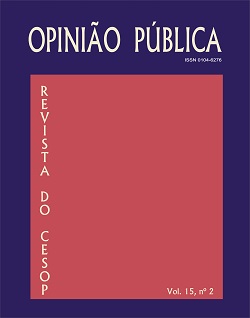Resumo
Este artigo examina a incidência da democracia liberal e “iliberal” na América Latina, de 1978 a 2004. Demonstra, em primeiro lugar, que a democracia iliberal - que combina eleições livres e justas com limitações sistemáticas aos direitos dos cidadãos - tornou-se a regra em toda a região. Em segundo lugar, mostra que as transições de regimes quase sempre levaram à variante iliberal da democracia. Terceiro, a análise logit de eventos raros revela que duas variáveis - hiperinflanção e eleições presidenciais - tiveram um impacto considerável sobre o movimento na direção de uma democracia mais plena. Como uma espécie de choque econômico de curto prazo, a hiperinflação produziu uma insatisfação generalizada; nessas circunstâncias, uma vez chegada a chance de votar, os cidadãos elegeram candidatos reformistas que, tão logo no poder, removeram obstáculos ao exercício de direitos civis. Um tal cenário aumenta substancialmente a probabilidade da transição da democracia iliberal para a democracia liberal.
Abstract:
This paper examines the incidence of liberal and “illiberal” democracy in Latin America from 1978 through 2004. It demonstrates, first, that illiberal democracy - which combines free and fair elections with systematic constraints on civil liberties - has become the norm throughout the region. Second, it shows that regime transitions have most often ended not in liberal democracy, but in illiberal democracy. Third, rare events logit analysis reveals that three variables - hyperinflation, general strikes, and presidential elections - have had significant impact on transitions toward fuller democracy. As a form of short-term economic shock, hyperinflation generates widespread discontent which sometimes results in general strikes; given the opportunity to vote, citizens elect reformist opposition candidates who, once in office, remove controls on civil liberties. This scenario substantially increases the likelihood of transition from illiberal to liberal democracy. Keywords: liberal and illiberal democracy; political and civil rights; political transition
Referências
BANCO MUNDIAL. World Development Indicators Database 2004. Washington, DC: Banco Mundial. Disponível em:<http://devdata.worldbank.org/dataonline>, 2004.
BANKS, A. Cross-National Time-Series Data Archive. Databanks International. Disponível em:, 2006.
CAROTHERS, T. “The End of the Transition Paradigm”. Journal of Democracy, v.13,nº 1, 2006.
CINGRANELLE, D. L. e RICHARDS, D. L. “Measuring the Level, Pattern, and Sequence of Government Respect for Human Rights”. International Studies Quarterly, v.43, nº 2, 1999.
COLLIER, D. e LEVITSKY, S. “Democracy with Adjectives: Conceptual Innovation in Comparative Research”. World Politics, v.49, nº 3, 1997.
DAHL, R. A. Polyarchy: Participation and Opposition. New Haven: Yale University Press, 1971.
DIAMOND, L. Developing Democracy: Toward Consolidation. Baltimore: The Johns Hopkins University Press, 1999.
DIAMOND, L. e MORLINO, L. (orgs.). Assessing the Quality of Democracy. Baltimore: Johns Hopkins University Press, 2005.
EPSTEIN, E. “Legitimacy, Institutionalization, and Opposition in Exclusionary Bureaucratic Authoritarian Regimes”. Comparative Politics, nº 17, 1984.
GASIOROWSKI, M. J. “Economic Crisis and Political Regime Change: An Event History Analysis”. American Political Science Review, v.89, nº 4, 1995.
HAGOPIAN, F. e MAINWARING, S. (orgs.). The Third Wave of Democratization in Latin America: Advances and Setbacks. Cambridge: Cambridge University Press, 2005. KAUFMAN, R. Industrial Change and Authoritarian Rule in Latin America: A Concrete Review of the Bureaucratic Authoritarian Model. In: COLLIER, D. (org.). New Authoritarianism in Latin America. Princeton: Princeton University Press, 1979.
KING, G. e ZENG, L. “Logistic Regression in Rare Events Data”. Political Analysis, v. 9, nº 2, 2001.
LUSTIG, N. (org.). Coping with Austerity: Poverty and Inequality in Latin America.,Washington DC: Brookings Institution, 1995.
MAINWARING, S. e PÉREZ-LIÑÁN, A. Latin American Democratization Since 1978:
Democratic Transitions, Breakdowns, and Erosions. In: HAGOPIAN, F. e
MAINWARING, S. (orgs.). The Third Wave of Democratization in Latin America: Advances and Setbacks. Cambridge: Cambridge University Press, 2005.
MAINWARING, S. e SCULLY, T. R. (orgs.). Building Democratic Institutions: Party Systems in Latin America. Stanford: Stanford University Press, 1995.
O’DONNELL, G. “Delegative Democracy”. Journal of Democracy, v. 5, nº 1 Jan., 1994.
O’DONNELL, G.; CULLELL, J. V. e IAZZATTA, O. M. (orgs.). The Quality of Democracy: Theory and Applications. Notre Dame: Notre Dame University Press, 2004.
PRZEWORSKI, A. Democracy and Development: Political Institutions and Well-Being in the World, 1950-1990. Cambridge: Cambridge University Press, 2000.
PRZEWORSKI, A.; ALVAREZ, M.; CHEIBUB, J. e LIMONGI, F. “What Makes Democracies Endure?”. Journal of Democracy, v. 7, nº 1, 1996.
REMMER, K. Debt or Democracy? The Political Impact of the Debt Crisis in Latin America. In: FELIX, D. (org.). Debt and Transfiguration? Prospects for Latin America’s Economic Revival. Armonk, NY: Sharp, 1990.
SCHEDLER, A. “Elections without Democracy: The Menu of Manipulation”. Journal of Democracy, v.13, nº 1, 2002.
_____ (org.). Electoral Authoritarianism: The Dynamics of Unfree Competition. Boulder: Lynne Rienner Publishers, 2006.
SMITH, P. H. “Los ciclos de democracia electoral en América Latina, 1900-2000”. Política y Gobierno , v.11, nº 2, 2004.
_____. Democracy in Latin America: Political Change in Comparative Perspective. New York: Oxford University Press, 2005.
SMITH, P. H. E ZIEGLER, M. Illiberal and Liberal Democracy in Latin America. Trabalho apresentado ao 26o. Congresso Internacional da Associação de Estudos LatinoAmericanos, San Juan, Porto Rico, março de 2006.
TOMZ, M.; Gary K. e Langche Z. “ReLogit: Rare Events Logistic Regression”. Stata Version, v.1, nº 1. 29 de outubro, 1999.
U.S. STATE DEPARTMENT. Country Reports on Human Rights Practices.
Washington, DC: U.S. Government Printing Office.
ZAKARIA, F. “The Rise of Illiberal Democracy”. Foreign Affairs, v.76, nº 6 nov./dez, 1997.
A Opinião Pública utiliza a licença do Creative Commons (CC), preservando assim, a integridade dos artigos em ambiente de acesso aberto.

